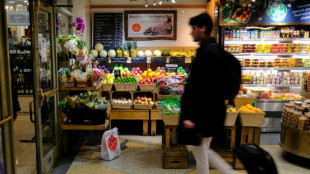-
 Ukraine Paralympics team to boycott opening ceremony over Russian flag decision
Ukraine Paralympics team to boycott opening ceremony over Russian flag decision
-
Wales captain Lake wants fans to bring 'noise' against Scotland

-
 Skier Vonn's Italian hospital a hotbed of men, sister says
Skier Vonn's Italian hospital a hotbed of men, sister says
-
India target S.Africa top order, Abhishek to come good: bowling coach

-
 Carrick praises Man Utd 'diversity' after Ratcliffe's immigrant rant
Carrick praises Man Utd 'diversity' after Ratcliffe's immigrant rant
-
I never thought it would be hit, says 'Scream' creator 30 years later

-
 AI summit statement delayed to 'maximise' signatories: India
AI summit statement delayed to 'maximise' signatories: India
-
Barcelona's Sagrada Familia basilica hits peak height

-
 Milan sprints to second straight UAE stage win as Tiberi keeps lead
Milan sprints to second straight UAE stage win as Tiberi keeps lead
-
US GDP growth misses expectations as Trump blames shutdown

-
 Benfica investigate video of fans' monkey gestures
Benfica investigate video of fans' monkey gestures
-
French minister pledges tight security at rally for killed activist

-
 Guardiola 'couldn't care less' about Arsenal stumble in title race
Guardiola 'couldn't care less' about Arsenal stumble in title race
-
UK police search property as royals reel from Andrew's arrest

-
 Germany's Merz to visit China next week
Germany's Merz to visit China next week
-
Kompany says Mourinho made 'huge mistake' in Vinicius racism row

-
 X appeals EU's 120-mn-euro fine over digital content violations
X appeals EU's 120-mn-euro fine over digital content violations
-
Galthie recalls hulking locks Flament, Meafou for Italy

-
 Turkey, Saudi sign major solar power deal
Turkey, Saudi sign major solar power deal
-
US Olympic freeskier Hess embraces 'loser' tag after Trump blast

-
 European stocks rebound, oil prices ease after US-Iran volatility
European stocks rebound, oil prices ease after US-Iran volatility
-
'Alpha male' AI world shuts out women: computing prof Hall

-
 New Zealand freestyle skier Ives in hard Olympic crash
New Zealand freestyle skier Ives in hard Olympic crash
-
New Zealand must adapt quickly to Sri Lanka wickets: Chapman

-
 Thai activist's jail term for royal insult extended to 30 years
Thai activist's jail term for royal insult extended to 30 years
-
Families of Duterte's drug war victims eye Hague hearing with hope

-
 India chases 'DeepSeek moment' with homegrown AI
India chases 'DeepSeek moment' with homegrown AI
-
UN touts panel for 'human control' of AI at global summit

-
 Ukraine Paralympics team to boycott Opening Ceremony over Russian flag decision: statement
Ukraine Paralympics team to boycott Opening Ceremony over Russian flag decision: statement
-
UK monarchy reels from Andrew's stunning arrest

-
 Somaliland, where Muslims love Israel
Somaliland, where Muslims love Israel
-
Florida airport to be renamed after US President Donald Trump

-
 Fans flock to Japan zoo to see viral baby monkey Punch
Fans flock to Japan zoo to see viral baby monkey Punch
-
Stocks mixed, oil rises after Trump Iran threat

-
 Outspoken Laos lawmaker's election exit sparks rare dissent
Outspoken Laos lawmaker's election exit sparks rare dissent
-
Kim Jong Un vows to boost living standards as he opens rare congress

-
 Shepherd hat-trick to Samra ton: Five top T20 World Cup performances so far
Shepherd hat-trick to Samra ton: Five top T20 World Cup performances so far
-
Zimbabwe surprise as T20 World Cup Super Eights begin without Australia

-
 Victorious Takaichi promises 'strong and prosperous' Japan
Victorious Takaichi promises 'strong and prosperous' Japan
-
Ex-South Korea leader apologises for martial law crisis

-
 Ex-S. Korea leader apologises for martial law crisis
Ex-S. Korea leader apologises for martial law crisis
-
Messi kicks off MLS season in key World Cup year

-
 Teen burnout to Olympic gold: Alysa Liu 'looking to inspire others'
Teen burnout to Olympic gold: Alysa Liu 'looking to inspire others'
-
Cunningham stars as NBA-leading Pistons ease past Knicks

-
 Andre Gomes joins MLS side Columbus Crew
Andre Gomes joins MLS side Columbus Crew
-
Scottish inconsistency 'bugs everyone' says former international Beattie

-
 England turn to Pollock for Six Nations boost against Ireland
England turn to Pollock for Six Nations boost against Ireland
-
Arsenal aim to banish title jitters in Spurs showdown

-
 Scrutiny on Flick rises as Barca seek recovery
Scrutiny on Flick rises as Barca seek recovery
-
Leipzig host red-hot Dortmund with Champions League hopes slipping away

Nature guardians: Why Indigenous people are vital for saving biodiversity
For countless generations prior to European colonization, Canada's Indigenous people relied on caribou both as a source of subsistence and as an integral part of their cultural practices.
Hunting and butchering the animal in frigid temperatures was long seen as a rite of passage, and members of the First Nations were the first to detect their serious decline.
"Fundamentally we are people of caribou," Valerie Courtois, director of Canada's Indigenous Leadership Initiative and a member of the Innu nation, told AFP.
"Caribou is what has really enabled us to survive, and to be who we are."
Today the species, which is known as reindeer outside North America, is endangered across much of Canada as a result of widespread habitat destruction from logging, roadbuilding, construction of transmission lines and more.
But an innovative pilot program led by Indigenous people might show a path to wider recovery.
As delegates from across the world meet in COP15 in Montreal this week to hammer out a new deal for nature, the case highlights the value of Indigenous stewardship in protecting ecosystems that benefit all humanity.
As detailed in a March 2022 paper in "Ecological Applications," the Klinse-Za subpopulation of caribou in British Columbia were once so plentiful they were described as "bugs on the landscape" but by 2013 had dwindled to just 38 animals.
That year, the First Nations of West Moberly and Saulteau devised a plan that saw them first cull wolves to reduce caribou predation, then added a maternal pen-fenced enclosures for females to birth and raise calves.
Their efforts saw the number of caribou of the herd triple in the area from 38 to 114.
With the threat of localized extinction averted, the two nations signed an agreement in 2020 with the governments of British Columbia and Canada to secure 7,900 square kilometers (3,050 square miles) of land for caribou, hoping to eventually revive their traditional hunt.
"When you protect caribou, a lot of animals come along for the ride," Ronnie Drever, a conservation scientist with nonprofit Nature United, told AFP.
"Good caribou conservation is also climate action," he added, because the old-growth forests and peatlands they live on are invaluable carbon sinks.
- Science catching up -
Globally, Indigenous people own or use a quarter of the world's land, but safeguard 80 percent of remaining biodiversity -- testament to centuries of sustainable practices that modern science is only just starting to understand.
A paper published this October in Current Biology looked at tropical forests across Asia, Africa, and the Americas, finding those located on protected Indigenous lands were the "healthiest, highest functioning, most diverse, and most ecologically resilient."
A 2019 paper in Environmental Science & Policy analyzed more than 15,000 areas in Canada, Brazil and Australia.
It found that the total number of birds, mammals, amphibians and reptiles were highest on lands managed or co-managed by Indigenous communities.
Protected areas like parks and wildlife reserves had the second highest levels of biodiversity, followed by areas that were not protected.
"This suggests that it's the land-management practices of many Indigenous communities that are keeping species numbers high," said lead author Richard Schuster, in a statement.
- Partnership crucial -
Jennifer Tauli Corpuz, of the Kankana-ey Igorot people of the Philippines, who is a lawyer and biodiversity expert with the International Indigenous Forum on Biodiversity, stressed that collaborative efforts were crucial.
"Conservation does not have a good history with Indigenous peoples, it's resulted in displacement," she told AFP.
National parks established on Euro-American notions that the land was once pristine "wilderness" typically prohibited Indigenous peoples from exercising their customary land uses, and forcibly displaced many from their ancestral homes.
Instead, she says, the rights of Indigenous groups need to be woven into the fabric of the new global biodiversity deal -- including a cornerstone pledge to protect 30 percent of land and water by 2030.
Indigenous groups say they should have greater autonomy to take the lead as managers of protected areas, arguing their successful record demonstrates they can pursue economic activity sustainably.
"The current biodiversity crisis is often depicted as a struggle to preserve untouched habitats," said a study published last year in the Proceedings of the National Academy of Sciences, which found that areas untouched by people were almost as rare 12,000 years ago as they are today.
"Current biodiversity losses are caused not by human conversion or degradation of untouched ecosystems, but rather by the appropriation, colonization, and intensification of use in lands inhabited and used by prior societies," it concluded.
A.Mahlangu--AMWN

